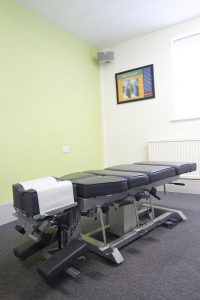As most of our clients know, back pain can range from mildly annoying to completely debilitating. Its physical effects can make even tire simplest of movements unbearably painful and leave the sufferer exhausted. The effects of back pain are far more wide reaching than we might initially realise however – for many, there are psychological and even financial effects to content with. This week, we look at some of the symptoms of back pain, which you might not have associated with the condition before.
Psychological impacts
Regardless of its cause, back pain is more than just a physical condition. It can also have a devastating emotional impact, especially when the pain goes on for a long time. Research shows that the widespread psychological effects of back pain extend beyond the patient, also impacting families and employers “in terms of sickness and absence and for society as a whole, in terms of welfare benefits and lost productivity.”[2]
Depression
Today its well recognised that chronic back-pain sufferers – particularly those afflicted with low-back
pain -have an elevated risk of developing depression , anxiety and “high levels of neuroticism[3] .”Worse yet, these psychological and social factors play a major role in worsening the perception of pain and the development of chronic disability – in essence, the problem feeds on itself, both physically and mentally.[4]
Canadian researchers note that “beliefs, attitudes, and recovery expectations appear to influence recovery from back pain .” This conclusion was based on a survey of 2,400 adult sufferers. “Most agreed that back pain makes everything in life worse, will eventually stop one from working, and will become progressively worse with age.”[5]
And the longer back pain is present, the worse things get. A recent study concluded that “Those whose low back pain was longer than five years had the highest scores for depression , general complaints and anxiety.” Longer duration of illness was similarly accompanied by even higher levels of anxiety, depression and obsessive-compulsive behavior[6].
That’s why chiropractors encourage those with back pain to take immediate action and remain realistic , patient and positive – with proper treatment your back pain can be managed and overcome – interrupting the cycle is the key first step, so don’t suffer in silence!
Decreased work productivity
Its no secret that thousands of work days are lost every year due to back pain. Increasingly employers are starting to recognise the value of proactive spine care for their employees, but there’s still a long way to go. Lost days at work can add up to significant financial stress over a long period of time, only adding to the stress which worsens back pain.
A recent study showed that among a cohort of 1,066 patients -a massive 48 percent reported back pain and 52 percent reported other forms of musculoskeletal pain – the severity of symptoms was directly associated with time lost from work, disability and utilization of health care[7]. There’s no question that looking after your back is good for both your personal and professional life.
Fortunately, chiropractic care is a recognised, effective, therapeutic option for back pain – both for immediate treatment and for the prevention of reoccurance. Canadian researchers examining the long term impacts of treatment also note that follow-up chiropractic helps keep pain at bay[8].
Social Impact
Social participation, subjective happiness and patient satisfaction are “closely correlated” with physical health status, according to Japanese researchers[9]. That’s no surprise to us, and its why our approach at complete chiropractic is geared towards providing optimal care for you and your whole family.
Back pain, once it has become bad enough, can begin to prevent people from enjoying activities which they once enjoyed – again it’s a vicious cycle, as its these kinds of activities which make a major contribution to keeping us happy and healthy.
Shortened Life Span

Unfortunately, Chronic back pain can even shorten your life. Among elderly women , daily back pain “is associated with reduced quality of life, mobility and longevity and increased risk of coronary heart events,” concludes a new report in the peer-reviewed medical journal Spine. These findings are from a five-year investigation of 1,484 Australian women , of 70 to 85 years of age. “The adverse health effects of chronic back pain deserve greater recognition” urge the study’s authors[10].
Decreased Self-Esteem
Many individuals with chronic back pain also feel stigmatized – while many are lucky enough to have people around them who understand and support them, that’s not always the case. For some, friends, employers and even family can be less than understanding of the limitations that back pain can impose on your life. Worse, its sometimes difficult to get the help you need from mainline medical professionals, who might not be specialists in back pain.
The wider impact of back pain on our relationships has been an area of much research lately, with a recent study concluding that “patients with chronic back pain feel stigmatised by the time they attend pain clinics – and this may affect their attitudes and behaviours towards those offering professional help.”[11]
Such was the case of 30 women in Finland who shared their pre-diagnosis history with researchers . “From the beginning of the early discomfort of back pain, the women were sure of its bodily and subjective reality.”[12] The researchers were astonished at the disrespectful attitude toward back-pain sufferers. “The moral essence of the women’s common story was the stigmatising experience when doctors did not take subjective pain seriously. Instead, doctors’ neglectful attitudes became part of the prolonged problem.”
After years of repeated attempts to get help, the women eventually found doctors who took their symptoms seriously. “To be finally diagnosed was a great relief. However, to be taken seriously as a person was considered to be the greatest relief.”[13].
Treating back pain

Our state of the art clinic
The best way to begin dealing with back pain and overcoming its associated symptoms is to address the issue directly – and why not start with chiropractic! When spinal movement is restricted or spinal bones (vertebrae) become misaligned, tire result is a common condition known as vertebral subluxation. Vertebral subluxation is linked with a myriad of health concerns, including back pain.
Chiropractors correct these vertebral subluxations, which, over time, will help to reduce and eliminate back pain, thus reducing its associated symptoms. Most clients experience a significant improvement in their pain within just a few sessions, but total control and elimination of pain is a long term process, so get in touch and get started today!
Indeed, a recent French study confirms the efficiency of short-term vertebral manipulation for chronic pain, especially low-back pain. Researchers separated a cohort of 64 patients into two groups: half received a series of four vertebral manipulations and half underwent “sham” adjustments. Patients receiving the true manipulations showed significant improvement in pain. Even more impressive, pain symptoms remained improved -as evidenced by follow-up testing two months later[1]. The group who received the “sham” adjustments, meanwhile, had absolutely no perceived change.
It’s vital not to self-diagnose the cause of back pain. Instead just make an appointment for a consultation and let us create a detailed picture of your symptoms and the underlying cause.
[1] Ann Re adapt Med Phys 2007 ;Epub
[2] Br Med J 2002;325:534.)
[3] Pain Med 2006;7:217
[4] Br M ed J 2002 ;325:534
[5] Spine 2006:31 ;2142-5
[6] East Mediterr H ealth J 2007 ; 13:335
[7] Ann Fam Med 2006 ;4.4:34 I
[8] J Manipulative Physiol Ther 2004 ;27:509-1 4
[9] Spine 2003 ;28:1461-6
[10] Spine 2007 ;32:2012-1 8
[11] Disabil Rehabil 2007;29:1456-64
[12] Soc Sci Med 2003 ;57 : 1045.)
[13] Soc Sci Med 2003 ;57: I045.)


